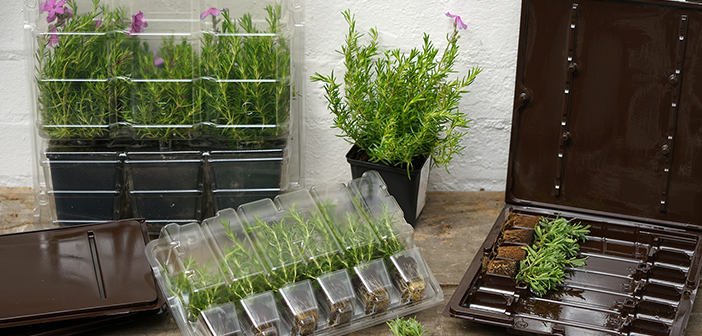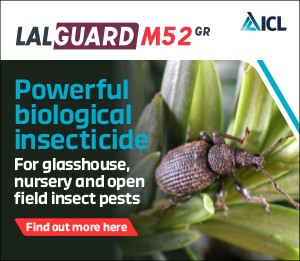During lockdown, when the garden centres were closed, many of the nurseries that sell plants online were fortunately much busier than usual. Other nurseries that were adversely affected by the Covid-19 pandemic began selling plants online to help boost trade. A key consideration for these mail order businesses is the way in which the plants are packaged. Rachel Anderson therefore discusses some of the innovative packaging solutions that growers and manufacturers use for mail order plants.
As Alex Everett, Aeroplas’ sales and new product development manager, notes: “Mail order is exciting. It’s done very well this year.” He explains that his customers tend to purchase their plastic pots from Aeroplas and then customise the remainder of the packaging – such as the cardboard box in which the potted plant sits. One of the growers to whom Aeroplas supplies its 5.5L pots (which are made from recycled material) is Chris Styles, of Style Roses in Lincolnshire. Chris says: “At the start of lockdown, we were dispatching up to twice what we normally would – anything up to 1,800 orders a week. Most of the orders tend to be single orders.” Chris hired three additional staff members to help the family business manage the time-consuming job of processing and packing. His roses sit in burgundy-coloured pots that are customised with the Style Roses logo. Several years ago, Chris worked with the packaging specialist DS Smith to develop an award-winning cardboard packaging solution that prevents the plants from moving around when they are being transported. He says: “We developed a flap that clips over the top of the pot and holds the plant in place. Also, if you bend the flap in half, it will hold a 4L pot as well. It’s quite a clever design.” Generously, the design team purposely chose not to patent its creation so that other growers could use this packaging solution. “A lot of the industry is using this box now,” explains Chris.
Other growers have their own packaging solutions. One such nursery is Hampshire-based Hardy’s Cottage Garden Plants. Owner Rosy Hardy says: “We’ve had to become adaptable and creative in the way that we box our plants.” She explains her custom boxes-made offers a cost-effective solution. As her perennials are sold in 1L and 3L pots the nursery uses seven or eight different box sizes to accommodate the many different configurations of pots that her customers order. “We have about four different styles of flower boxes, which we keep the plants upright in and we have some other boxes which we can lie the plants down in.” Rosy and her team use canes or old pots to help keep the plants in place. They also use eco-friendly, biodegradable Eco Flo to help cushion the products. Hardy’s cardboard box suppliers include ASC Direct and the Cardboard Box Company. “Some other companies require us to order five pallet loads of boxes and we just don’t have the space. We cannot store the boxes outside – or even in a polytunnel – because moisture is a problem. Once they become damp they are not as strong.”
Rosy uses round-shaped pots for her plants, but staff at The Beth Chatto Gardens’ nursery and online store in Essex prefer to use square-shaped pots, where possible. This shape fits nicely into the plant-holding trays it uses. Steve Marshall, online sales and horticultural education manager, says that the nursery mainly uses square pots that are 1L in size. “They are easier to post, easier for the consumer to plant and easier for us to work with on site.” He adds that the nursery is now switching to taupe-coloured pots, which can be added to kerbside recycling boxes. Furthermore, The Beth Chatto Gardens’ nursery and online store uses cardboard boxes – supplied by Essex Packaging – that fit its plant trays; namely, six 1L plants or 12 1L plants. To keep the plants safe and secure in transit, its e-commerce staff cushion the plants with either cardboard or scrunched up paper, much of which has already been used before. Steve explains: “We would rather use that than secure the products with plastic tape or use plastic trays.”
A representative for packaging specialist Macpac notes that on-line sales for many businesses in the horticulture sector have meant the difference between success and failure during the Covid-19 crisis, with many growers diversifying to online sales to stay afloat.
“Macpac had the answer to the packaging issue faced by many companies looking to enter this market sector and were able to offer their wide range of packaging options for protecting plug plants and more established potted plants through the postal system.”
“A way of delivering plants safely, securely and cost effectively through the post direct from the grower was easily available with Macpac’s ever-growing range of Plantpac products (feature image), including Plug Plant packs, ‘Ready-to-Post’ range and Seed Tray Propagator Packs.”
The Ready-to-Post range has been designed to work with the Royal Mail postal system. It can be sent as a large letter item at the reduced cost compared to a packet or parcel and is robust enough for challenging logistical environments. The result is a convenient range of packs providing maximum protection and ventilation for the plants during transit and all packs are 100% recyclable through kerb side collections.
Nurseries that sell their plants online often source their plastic pots either directly, or through a horticultural products distributor, such as Fargro. Fargro’s marketing manager Melanie Wood says: “We are seeing an increase in the demand for mail order packaging, with many of our customers introducing an online service. It is important to factor in durability, size and weight of the end product to take into account courier restrictions.” Fargro offers online horticulture businesses some innovative solutions, such as blister packs that hold the soil in one compartment and protect the foliage in the other part. The blister packs are designed to be lightweight, transparent, have self-locking closing buttons, and openings for aeration.
Meanwhile, packaging specialist Soparco have many products well suited to mail order plants. It offers, for example, a large range of trays that fit various sizes and shapes to simplify the delivery process. Soparco Communication Office Myriam Tobeilem adds: “Our plant supports, SOPAFIX, are really helpful as they can be used as a handle to support several pots at once but also to protect the plant.” Furthermore, its SX range of eco-friendly, colourful containers are lightweight as they’ve been purposely designed to use less plastic. Helpfully, their lightweight design makes them a good option for plants that are going in the post.
Another lightweight, eco-friendly design is David Austin Roses’ plastic-free packaging for its bare root roses. Prior to the launch of this product, these dormant plants were packaged in an inner carrier made of plastic, designed to lock in moisture and prevent dehydration during delivery and storage. Richard Austin, head of marketing for the Wolverhampton-based business, says: “Removing these carriers in their entirety wasn’t an option but we knew a plastic-free solution was out there. We wanted something that was recyclable at the very least but had to keep our plants safe and hydrated till planted. After extensive research we were able to come up with a carrier made from potato starch, which is 100% biodegradable and perfect for the compost heap or the food waste bin. We’ve also refreshed the design of the outer brown bag, giving it a new look while keeping it fully recyclable.”
From investing in biodegradable or recyclable materials to reusing old pots and canes, growers are evidently being mindful of the environment when they create their packaging for mail order plants. They are also considering how best to keep the plants safe during transport – and how to create the most cost-effective packaging solution for their business. Certainly, there are many different options to choose from but by working with packaging and horticultural equipment suppliers, they are finding the best possible solution.














